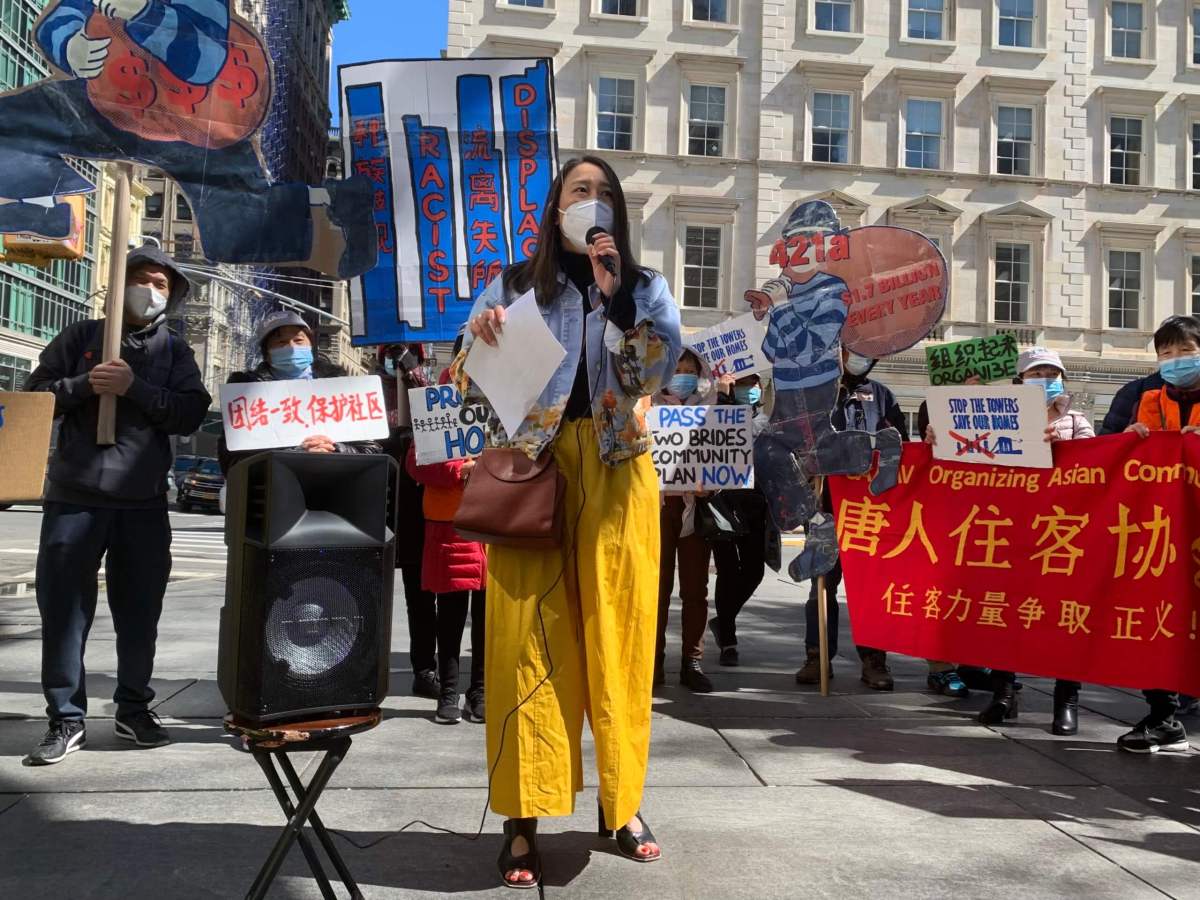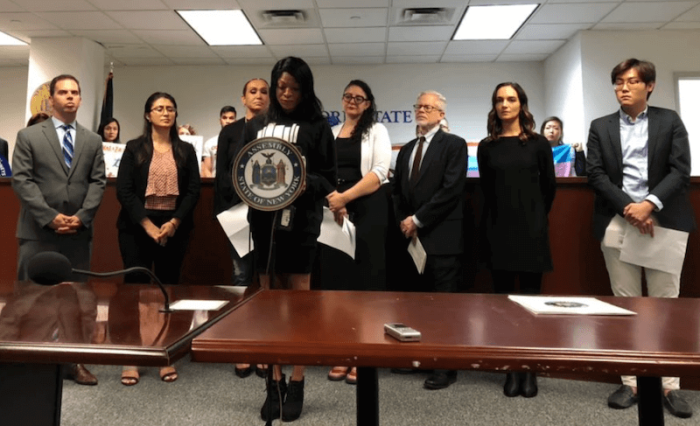Several Chinatown and Lower East Side tenants and neighborhood associations rallied Monday morning calling on the city’s Department of Buildings (DOB) to stop a developer from digging foundations in Two Bridges in an attempt to use the 421-a tax break to build new residential towers there before the subsidy expires in June.
“We are here together because, obviously, there are folks that are going to try to push through for emergency permits, for rapid permits, for permits to to speed up different kinds of developments right now because the legislature has let expire 421-a,” said progressive Assemblywoman Yuh-Line Niou (D – Manhattan).
Joining Niou were representatives of organizations including CAAAV: Organizing Asian Communities, CAAAV Chinatown Tenants Union, New Immigrant Community Empowerment (NICE) and Good Old Lower East Side (GOLES).
The coalition argues that the developer Joe Chetrit, who runs The Chetrit Group, is trying to expedite the construction of two 70-foot luxury apartment towers at 265 Cherry Street near the Two Bridges waterfront by appealing to DOB for special permissions to dig foundations for the buildings ahead of getting other required approvals. They say this is an attempt to take advantage of the 421-a housing subsidy before it expires on June 15.
But DOB Press Secretary Andrew Rudansky said that Chetrit is following the standard phased approval process for new construction and that beginning to dig foundations didn’t require any special permissions.
“Codes here in NYC allow applicants to proceed with earthwork and foundation approvals prior to full new building approvals, if they submit certain required items, including a fully compliant application for the foundation, and a DOB-approved zoning diagram for the building,” Rudansky said.
The demonstrators said if DOB allows Chetrit to construct these towers on an expedited timeline, it will displace the area’s low-income residents, lead to environmental hazards in the neighborhood and endanger workers constructing the buildings. The advocates also submitted a letter to DOB calling on the agency to freeze Chetrit’s work permits for these buildings.
Bin Liang, one of the founders of CAAAV Chinatown Tenants Union, said if the towers are built it’ll raise rents and prices – pushing out some of the neighborhood’s longtime residents.
“I used to be a Chinese teacher and have been living in Chinatown for 24 years. I have seen the change as Chinatown is gradually being gentrified,” Liang said through CAAAV organizer Julie XuI, who translated for her. “This time the builders are taking over land to push out longtime residents. Chetrit Group is going to force the eviction of residents of Chinatown for the construction of these high-rise luxury towers. This is forced displacement of low-income residents. This is racism.”
The 421-a tax abatement is intended to incentivize developers to build affordable housing units. Traditionally, developers have used the tax break to construct buildings that have 80 percent market rate and 20 percent affordable apartments. The real estate industry has long argued they need 421-a or an equivalent subsidy in order to build any affordable housing.
Real estate developers supported Governor Kathy Hochul’s proposal to replace 421-a with a new program called 485-w, which the governor tried and failed to include in the state budget that passed over the weekend. Another proposal to extend 421-a for another year through the budget process also failed to gain traction.
Niou, along with many other opponents of the tax break, has argued that it doesn’t actually generate affordable housing because of the flawed formula it uses to calculate affordability and instead is just a giveaway to developers.
“We know that these kinds of developments drive up costs in the surrounding area and do little to house community members because the target incomes of each of these apartments are usually double or more what a family in the area has,” Niou said. “Through the deeply flawed 421-a program that everybody knows is a developer giveaway, they get a massive tax cut if they make a small percentage of units affordable. And they tell us that that should be enough for us, and that we shouldn’t complain.”
Now that negotiations are over and the budget is passed, Niou said, she thinks there’s little chance of a replacement for 421-a getting through before the end of the legislative session in June. This is mostly because, she added, the legislature is broadly against renewing the tax break and the governor has much less power outside of the budget process.
“There’s a disparity in the powers for the executive and the legislature during the budget process,” Niou said. “And so, I think that with legislation comes a much more equal extension of powers to the legislature and the legislature should take full power back when it comes to our legislation.”
A reporter from amNY reached out to The Chetrit Group for comment and is awaiting a response.






































